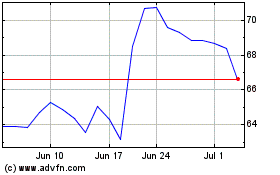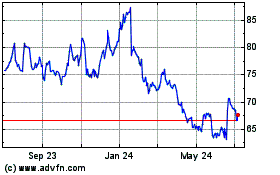New Data for Gilead Sciences’ Ambrisentan Show Clinical Improvements in a Diverse Pulmonary Hypertension (PH) Population
May 18 2009 - 11:15AM
Business Wire
Gilead Sciences, Inc. (Nasdaq: GILD) today announced results
from ARIES-3, an open-label, single-arm, Phase III study evaluating
the efficacy and safety of ambrisentan in patients with pulmonary
hypertension (PH), which showed a mean 21-meter improvement from
baseline in six-minute walk distance (6MWD) at 24 weeks.
Ambrisentan is approved under the tradename Letairis� (ambrisentan
5 mg and 10 mg tablets) as a once-daily treatment for pulmonary
arterial hypertension (PAH) (WHO Group 1) in patients with WHO
functional class II or III symptoms to improve exercise capacity
and delay clinical worsening. The ARIES-3 study included patients
with PAH (WHO Group 1) as well as patients with pulmonary
hypertension due to other etiologies (WHO Groups 3, 4 and 5). Data
from this study were presented today at the 2009 American Thoracic
Society (ATS) International Conference, taking place May 15-20 in
San Diego.
�In previous clinical trials, ambrisentan has been shown to
improve exercise capacity and delay clinical worsening in WHO Group
1 PAH patients with WHO functional class II and III symptoms,� said
David Badesch, MD, Professor of Medicine and Clinical Director of
the Pulmonary Hypertension Center at the University of Colorado
Health Sciences Center and lead study author. �However, many
patients seen in clinical practice have pulmonary hypertension
associated with other diseases. ARIES-3 is important because it
represents the first safety and efficacy data for ambrisentan in a
more diverse PH patient population, including patients already on
background therapy.�
About ARIES-3
ARIES-3 was an open-label, single-arm, multicenter, Phase III
study designed to evaluate the efficacy and safety of ambrisentan
in a broader PH population than was studied in the ARIES-1 and
ARIES-2 studies. The study enrolled 224 patients with WHO Group 1
PAH (n=140) or PH due to other etiologies (n=84), including 23
patients with PH secondary to chronic obstructive pulmonary disease
(PH-COPD) (WHO Group 3), 21 patients with PH secondary to
interstitial lung disease (PH-ILD) (WHO Group 3) and 29 patients
with PH due to chronic thromboembolic disease (CTEPH) (WHO Group
4). Patients received ambrisentan at a dose of 5 mg once daily
until the primary analysis of efficacy at 24 weeks. The primary
endpoint was the change from baseline in 6MWD at Week 24. Secondary
objectives were to evaluate the effects of ambrisentan on other
clinical measures of PH, including the number of patients still
alive at specified time points and time to clinical worsening,
which was defined as the time from initiation of ambrisentan to the
first occurrence of death, lung transplantation, hospitalization
for PH, atrial septostomy, a change to chronic prostanoid therapy
or sildenafil due to protocol-defined worsening criteria or study
withdrawal due to addition of other PH medications. In addition,
the safety and tolerability of ambrisentan was evaluated in the
overall study population and in various subgroups.
At baseline, 29 percent of patients were classified as having
WHO functional class II symptoms and 65 percent of patients had WHO
functional class III symptoms. The mean baseline 6MWD for patients
was 317�84 meters. At baseline, 52 percent of all patients were
receiving sildenafil and/or prostanoid therapy. Twenty-seven
patients in the study had previously discontinued use of bosentan
and/or sitaxsentan due to liver enzyme (aminotransferase)
elevations greater than three times the upper limit of normal
(ULN).
In the overall study population, patients experienced a mean
6MWD improvement of 21 meters (95 percent CI: 11.8 to 29.3; p
Gilead Sciences (NASDAQ:GILD)
Historical Stock Chart
From May 2024 to Jun 2024

Gilead Sciences (NASDAQ:GILD)
Historical Stock Chart
From Jun 2023 to Jun 2024
